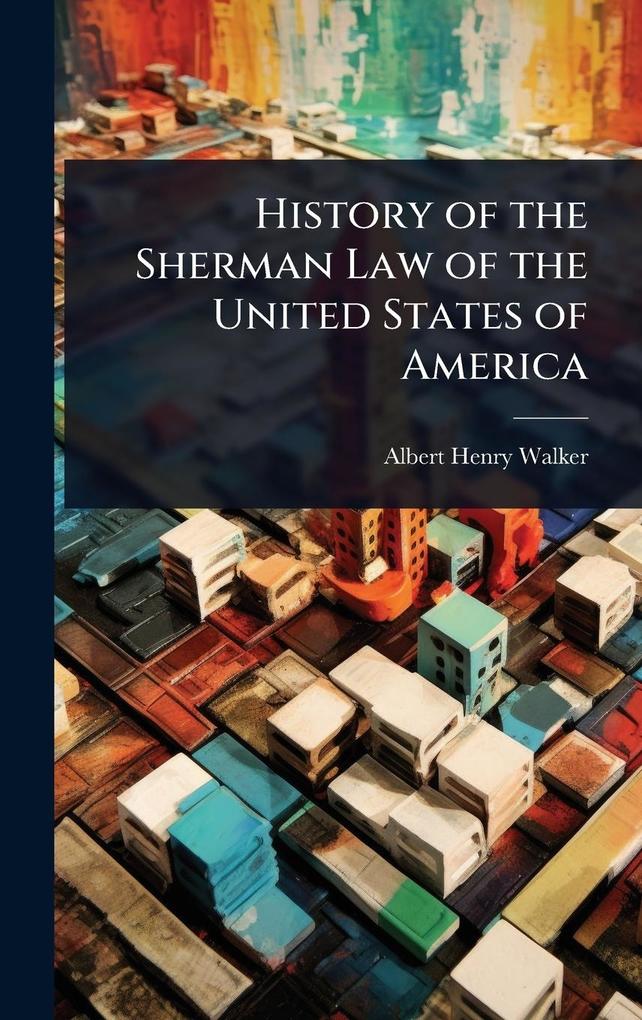
Zustellung: Sa, 26.07. - Do, 31.07.
Versand in 2 Wochen
VersandkostenfreiBestellen & in Filiale abholen:
History of the Sherman Law of the United States of America, written by Albert Henry Walker and originally published in 1910, provides a comprehensive overview of the Sherman Antitrust Act and its early interpretations. This seminal work explores the origins, development, and initial applications of the landmark legislation designed to prevent monopolies and restraint of trade. Walker meticulously details the legal landscape that led to the Act's passage and examines key cases that shaped its understanding and enforcement.
Offering valuable insights into the economic and political context of the late 19th and early 20th centuries, this book remains an essential resource for legal scholars, historians, and anyone interested in the evolution of antitrust law in the United States. It captures a pivotal moment in American history when the government sought to regulate burgeoning industries and protect consumers from unfair business practices. Walker's thorough analysis provides a foundational understanding of the principles that continue to influence antitrust policy today.
This work has been selected by scholars as being culturally important, and is part of the knowledge base of civilization as we know it. This work was reproduced from the original artifact, and remains as true to the original work as possible. Therefore, you will see the original copyright references, library stamps (as most of these works have been housed in our most important libraries around the world), and other notations in the work.
This work is in the public domain in the United States of America, and possibly other nations. Within the United States, you may freely copy and distribute this work, as no entity (individual or corporate) has a copyright on the body of the work.
As a reproduction of a historical artifact, this work may contain missing or blurred pages, poor pictures, errant marks, etc. Scholars believe, and we concur, that this work is important enough to be preserved, reproduced, and made generally available to the public. We appreciate your support of the preservation process, and thank you for being an important part of keeping this knowledge alive and relevant.
Offering valuable insights into the economic and political context of the late 19th and early 20th centuries, this book remains an essential resource for legal scholars, historians, and anyone interested in the evolution of antitrust law in the United States. It captures a pivotal moment in American history when the government sought to regulate burgeoning industries and protect consumers from unfair business practices. Walker's thorough analysis provides a foundational understanding of the principles that continue to influence antitrust policy today.
This work has been selected by scholars as being culturally important, and is part of the knowledge base of civilization as we know it. This work was reproduced from the original artifact, and remains as true to the original work as possible. Therefore, you will see the original copyright references, library stamps (as most of these works have been housed in our most important libraries around the world), and other notations in the work.
This work is in the public domain in the United States of America, and possibly other nations. Within the United States, you may freely copy and distribute this work, as no entity (individual or corporate) has a copyright on the body of the work.
As a reproduction of a historical artifact, this work may contain missing or blurred pages, poor pictures, errant marks, etc. Scholars believe, and we concur, that this work is important enough to be preserved, reproduced, and made generally available to the public. We appreciate your support of the preservation process, and thank you for being an important part of keeping this knowledge alive and relevant.
Produktdetails
Erscheinungsdatum
22. Mai 2025
Sprache
englisch
Seitenanzahl
336
Autor/Autorin
Albert Henry Walker
Verlag/Hersteller
Produktart
gebunden
Gewicht
644 g
Größe (L/B/H)
234/156/19 mm
ISBN
9781024108446
Bewertungen
0 Bewertungen
Es wurden noch keine Bewertungen abgegeben. Schreiben Sie die erste Bewertung zu "History of the Sherman Law of the United States of America" und helfen Sie damit anderen bei der Kaufentscheidung.









